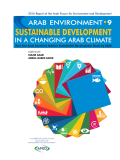Stocktaking on Inclusive Green Economy in Central Asia and Mongolia: A Sub-Regional Perspective was produced as part of the United Nations Environment Programme (UNEP) project “South-South Cooperation in Mongolia and Central Asian Countries: Sharing Knowledge on Inclusive Green Economies”. The project aimed to support Mongolia and Central Asian countries in developing their research capacity in the area of Green Economy and Ecological Civilisation and to share this knowledge with decision-makers and technical experts through knowledge exchange between China, Central Asian countries, and Mongolia.
This report aims to shed light on how EECCA countries and development co-operation partners are working together to finance climate actions, using the OECD DAC database to examine finance flows by provider, sector, financial instrument, channel, etc. A significant amount was committed by international public sources to the 11 countries comprising the EECCA in 2013 and 2014 (i.e. USD 3.3 billion per year), but the scale of such finance varies considerably from country to country and is insufficient to achieve and strengthen their climate targets communicated through the Intended Nationally Determined Contributions COP21.
In addition, while a range of climate-related policies have already been developed by the EECCA countries, the extent to which such policies are being effectively implemented and conducive to attracting climate finance is still unclear. In this respect, this report proposes a set of questions for the EECCA countries to self-assess their readiness to seize opportunities to access scaled-up climate finance from various sources: public, private, international and domestic.
The Urban Green Growth in Dynamic Asia project explores how to promote green growth in cities in Asia, examining policies and governance practices that encourage environmental sustainability and competitiveness in a rapidly expanding economy. This synthesis report presents the results of case studies along with practical policy recommendations, reflecting the local contexts of Southeast Asia. While Southeast Asian cities are affected by a range of economic, infrastructure, environmental and social challenges, ongoing rapid development offers opportunities to shift towards greener growth models. The concept of urban green growth can be a powerful vector of sustainable development, by emphasising the existence and potential of co-benefits between economic and environmental performance.

This AFED report on "Sustainable Development in a Changing Arab Climate" recommends an alternative approach, based on integrating sustainable development principles within the anticipated rebuilding efforts. It calls upon local, regional, and international aid organizations not to limit their efforts to providing safety and basic necessities to those affected, but rather to use the relief plans as a launch pad for promoting new approaches to development, rooted in a transition to green economy.
This report, on prospects and challenges on the path towards achieving the SDGs, builds on the previous eight reports on the state of Arab environment, produced by the Arab Forum for Environment and Development (AFED) since 2008. AFED annual reports have so far addressed major development issues in the Arab region, including Water, Food Security, Energy, Green Economy, Ecological Footprint, Sustainable Consumption, and Climate Change. The report highlights the policy options available for the Arab countries to realize the Sustainable Development Goals by the 2030 target set by the United Nations, in light of the new political, economic, and social developments.
This report is a review of best practice greening opportunities for Asian beef supply chains. It includes feed and livestock production; meat processing; value-added and by-products processing; transport and distribution; and finally domestic consumption. Consideration is given to both advanced and less developed supply chains and the issues faced by actors in these supply chains. The report is expected to serve as a point of orientation for practitioners in their adoption of green industry policies and practices and improvements that can be made in environmental performance. Where appropriate, a 'closed-loop' approach is presented whereby all by-products are recovered and usefully applied to the highest possible level.
